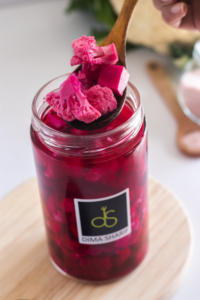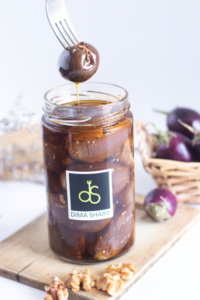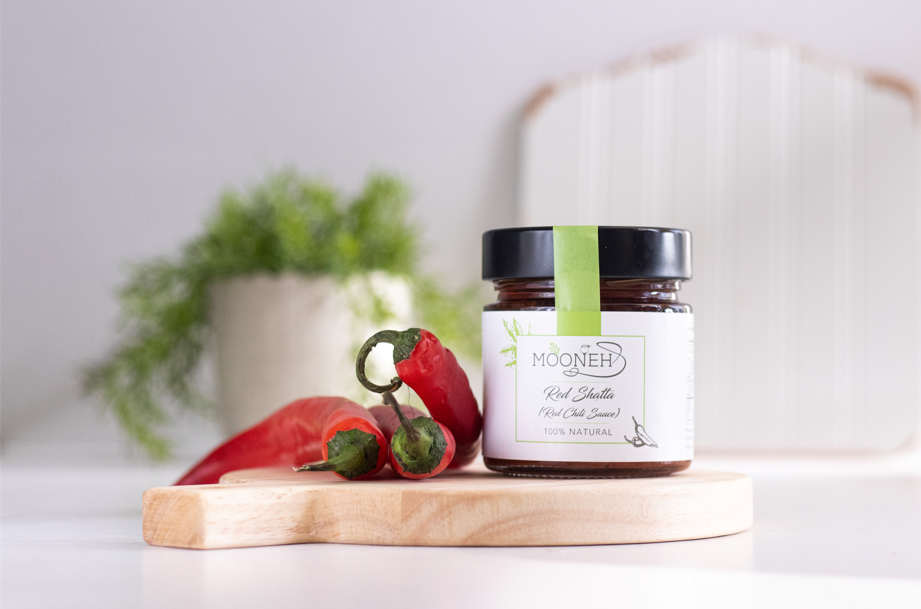Dubai – Foods grown locally in the United Arab Emirates are the base ingredients of the products by Mooneh. The startup was founded by Palestinian chef Dima Al Sharif. “When I first came to the UAE, nobody talked about organic, local farms or organic, local food. This was back in 2005. My family has worked in farms. I grew up hearing about the challenges the farmers faced in different circumstances,” Sharif said.
In an interview with ANBA, the chef and her business partner and husband Firas Kanaan, who’s also from Palestina, told the story of the startup, which stemmed from a personal desire. Sharif grew up in Jordan, where part of her family owns an orange farm. Use to live in an agricultural country, where the preference is for fresh items, she missed organic options to feed her kids.

The chef, who wrote the book Plated Heirlooms, learned about local food farming in the GCC country. “This led me to find something that was really surprising – there is a produce industry in the UAE. We all had arrived here believing it was all desert. And a desert naturally means no agriculture. I’d never thought this would be possible. And before I even realized, I was standing before small organic farmers, she said.
For making the foodstuffs reach more people, the first step was organizing a group to create a kind of open market where the farmers sold their products. But Sharif didn’t stop there.
Around 14 years ago, she started writing about local, organic farming for online and print publications, as well as participating in seminars in schools. “Part of me was trying to convince them that looking at this was caring about the health and the planet. And in the UAE nobody used to say that back then. We were pioneers in this sense,” she said.
New recipes, ancestral techniques
To go beyond their own consumption, came the idea of creating a food startup. “Am I or Mooneh enough? No. But it is a start, Mooneh is about supporting communities, so we could support the Brazilian market, too. The smaller the company, the more working with them is a priority for us,” she said.

That’s where Sharif’s experience as a chef came in. “My regional ancestry inspired Mooneh. And we have updated it, too, to something healthy and modern. We have created really tasty recipes,” she said.
The main products by the company are sweet, savory and spicy jams. They also have hummus, tomatoes, olives and other dips and fresh produces. The jams are made with traditional food preservation techniques.
The naturally conserved food items can last for a year. The process includes fermented foods, probiotics and superfoods like chia and goji berries. “Many say that our foods is like medicine. It solves problems. Some clients come and then come back the next week to buy more. Because they feel their body and mind better,” Kanaan said.
Local farming
The couple says that they buy from different farmers across the UAE, sending a request to a list of farmers including what they are buying and asking about available volumes and prices.

The suppliers that are closest to Mooneh are only an hour’s drive from the factory, and most of them are concentrated in the emirates of Al Ain and Abu Dhabi. If the company can’t find a specific food, they search for them in neighboring countries like Oman and Saudi Arabia. And in the case of products that are not grown in the region, like oranges, the solution is having their family’s farm in Jordan as a supplier.
Kanaan explains that the brand work with traceability, visiting farms regularly. Another concept that is part of the company’s policy is respecting food seasonality.
Future
The couple underscores that they are not against technology but values the original flavors of each food. “The future does not have to [completely overcome] our past and present. It’s a choice to take what we want to drop what doesn’t serve us. This is our the methodology,” Sharif explains.
For them, developments like the coronavirus pandemic have increased the number of clients interested in more natural foods, and there is no going back. “The thing today is the environmental changes. So why would we need to wait for these several pushes to come?” they finish.
Translated by Guilherme Miranda




